Art, Science, and Pop Culture Blog
Wednesday, July 29, 2015
Thursday, July 16, 2015
The Year of Pluto - New Horizons Documentary ...
Published on Jun 12, 2015
New
Horizons is the first mission to the Kuiper Belt, a gigantic zone of
icy bodies and mysterious small objects orbiting beyond Neptune. This
region also is known as the “third” zone of our solar system, beyond the
inner rocky planets and outer gas giants. Johns Hopkins University
Applied Physics Laboratory (APL) in Maryland, designed, built and
operates the New Horizons spacecraft, and manages the mission for NASA’s
Science Mission Directorate in Washington. The Year of Pluto - NASA
New Horizons is a one hour documentary which takes on the hard science
and gives us answers to how the mission came about and why it matters.
Interviews with Dr. James Green, John Spencer, Fran Bagenal, Mark
Showalter and others share how New Horizons will answer many questions.
New Horizons is part of the New Frontiers Program, managed by NASA’s
Marshall Space Flight Center in Huntsville, Alabama.
FEATURED ART OF THE DAY!!
Title: Voyager
Digital Art
During the climax of the film Star Trek, the Motion Picture it was revealed that an ancient space probe from the planet Earth known as Voyager had returned after alien contact and hundreds of years. V-Ger (Voyager) intended to reunite with its creator. Do you think this is possible?? Do you know where Voyager is now?? Goto voyager.jpl.nasa.gov to find the answer!!
By Shawn-Todd O'Malley
Original Art by Shawn-Todd O’Malley
Visit me on my Art Gallery on Facebook!
Here is a link:
http://www.facebook.com/

Digital Art
During the climax of the film Star Trek, the Motion Picture it was revealed that an ancient space probe from the planet Earth known as Voyager had returned after alien contact and hundreds of years. V-Ger (Voyager) intended to reunite with its creator. Do you think this is possible?? Do you know where Voyager is now?? Goto voyager.jpl.nasa.gov to find the answer!!
By Shawn-Todd O'Malley
Original Art by Shawn-Todd O’Malley
Visit me on my Art Gallery on Facebook!
Here is a link:
http://www.facebook.com/

7 Fascinating Facts We Just Learned About Pluto
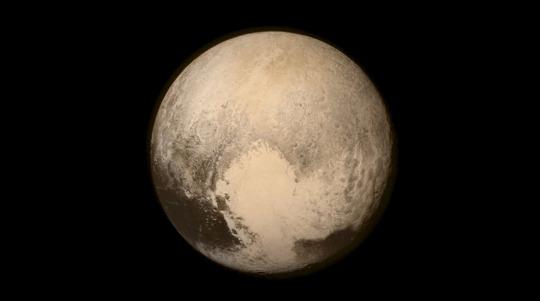
(NASA)
Fasten your seat belts, space cadets: We’re officially in the final countdown to NASA’s 3-billion-mile journey to Pluto.
Pluto
was actually still a planet when the space agency launched the mission
in early 2006. (In case you’ve been living in a crater for the past nine
years, Pluto was unceremoniously demoted due to its size that same
summer. It’s now considered a “dwarf planet” — which I’m assured by our
HR department is a perfectly acceptable term to use — or a “plutoid,” if
you’re feeling politically correct.)
Today, the agency’s unmanned New Horizons spacecraft is
in a galaxy far, far away — or, at least, at the edge of our solar
system. Earlier this morning it brushed up against the former planet’s
private space, coming within 8,000 miles of the dwarf — err, plutoid.
While we won’t get the full scope of NASA’s findings for a while,
details about the enigmatic Pluto are slowly but surely trickling in.
Behold: seven titillating tidbits we just learned about everyone’s favorite dwarf planet.
1. It may be a dwarf, but Pluto measures up better than we thought
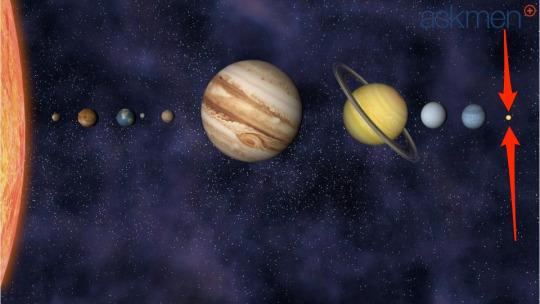
(Wochit)
Early measurements indicate Pluto has a diameter of about 1,473 miles
— the equivalent of nearly 22,000 football fields stacked end to end.
That’s about 44 miles more than scientists’ previous starting estimate.
Here’s
what really counts: The new measurement means Pluto is now considered
the largest solar system object beyond Neptune’s orbit. It’s less dense
than we thought, too, with an icier interior.
See? Size does matter.
2. Pluto has strong gas
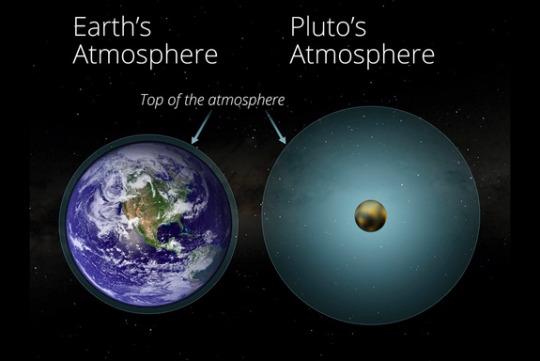
(PlutoSafari.com)
That
isn’t Uranus you’re smelling, folks: NASA scientists have confirmed
they’ve found nitrogen seeping out of Pluto’s atmosphere. The nitro
showed up a full four days earlier than the team had expected, which
suggests Pluto could be losing its atmosphere faster than previously
believed.
It also explains why Pluto never gets invited to any interplanetary dinner parties.
3. Pluto’s wearing a stylish ice cap

(Associated Press)
Speaking
of gas, New Horizons has revealed that Pluto’s so-called polar cap is
actually made up of ice — frozen methane and nitrogen, to be specific.
So let’s all just chill for a minute, OK?
4. Pluto has a heart — and a whale
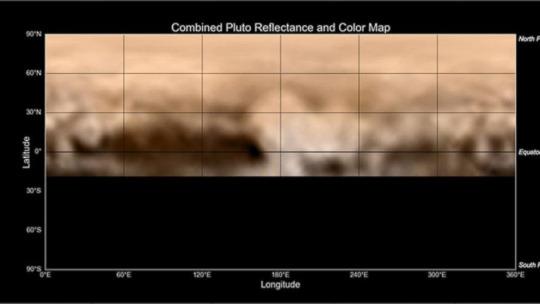
(ABC News)
Among the geographical features observed on Pluto’s surface are a “whale” — a dark band along the plutoid’s equator, complete with a tail-like attachment — and a bright heart
to keep everyone feeling warm and fuzzy inside. It’s too soon to know
what either shape represents, but we’re holding out hope for a colony of
super-affectionate alien sea creatures.
5. It also has cliffs and craters
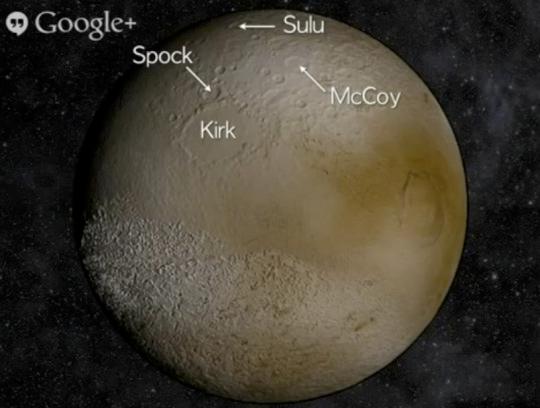
(SETI Institute/Space.com)
Some of the craters could be signs of impact, formed from smaller objects slamming into Pluto’s surface. Once again, all the big planets are ganging up on the little guy.
To make up for this solar-systemic bullying, researchers are thinking about naming some of Pluto’s craters after characters in Star Trek. No, really — they are.
6. Some of Pluto’s spots are even more mysterious
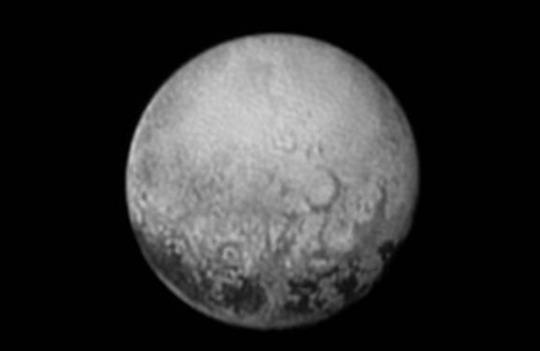
(Space.com)
Forget the cliffs, craters, and whales (oh my!): What scientists really want to understand is what’s going on with a series of dark spots
seen on Pluto’s side. The spots are closely aligned in size and spacing
— an effect NASA experts describe as “weird” (that’s the technical
term).
We understand NASA’s next mission to Pluto will include a payload of Porcelana anti-aging cream.
7. Pluto’s moons are, like, superdeep, dude
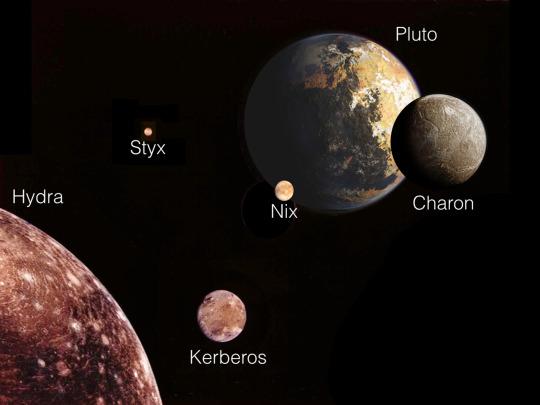
(Associated Press)
Pluto
has five known moons, and we’re learning more about ’em with every
passing day. The largest one — Charon (“Don’t Call Her Sharon”) — is filled with craters. And get this: One of the craters is longer and deeper than our own Grand Canyon.
That’s
all just scratching the planetary surface, ladies and gents. New
Horizons is scheduled to check back in late Tuesday evening after its
fly-by has finished. It may take some time for any sort of final report
to be released, but believe us: The results should be out of this world.
Saturday, June 27, 2015
New Horizons and Pluto
As the Piano-Sized New Horizons Spacecraft Approaches, Pluto and Charon Are Coming Into Intriguing Focus
By Tom Yulsman | June 26, 2015 2:19 pm
Pluto (right) and Charon (left) as seen by the New Horizons
spacecraft on June 19, 2015. (Source: NASA/Johns Hopkins
University Applied Physics Laboratory/Southwest Research
Institute)
The New Horizons spacecraft is about 13 million miles from Pluto and its largest moon, Charon. If that seems really far, consider the image above.
It was captured by the Long Range Reconnaissance Imager instrument, or LORI, when the piano-sized spacecraft was even farther away — 20 million miles, give or take. Yet LORI could begin to pick out some intriguing surface detail on both bodies.
Note the light and dark features on Pluto, to the right, which are indicative of large-scale aspects of the planet’s terrain. (Although Pluto seems to have an irregular shape, that’s an illusion created by the pattern of dark and bright regions.)
And check out that dark region on Charon’s north pole. It has been called an “anti-polar cap” — and for now, it is quite mysterious.
Alan Stern, the mission’s principal investigator, from the Southwest Research Institute, reacted this way:
About Charon—wow—I don’t think anyone expected Charon to reveal a mystery like dark terrains at its pole . . . Who ordered that?”
Now, New Horizons is just 17 days out from its closest encounter with Pluto. If all goes well (and a lot could go wrong!), on July 14 the spacecraft will swoop to within about 7,750 miles of Pluto (17,900 miles of Charon). For about a half hour, it will take close-up pictures in both visible and near-infrared wavelengths — images that should be able to resolve surface features as small as 200 feet across.
So if there’s a football stadium on Pluto, New Horizons should spot it!
New Horizons is also beginning to beam us images that are being made into the first color movies of Pluto and Charon. Here’s one:
A near-true color movie of Pluto and Charon made from images acquired by an instrument
on New Horizons known as “Ralph” (a reference to the television show the Honeymooners).
The images were taken on nine occasions between May 29 and June 3, 2015. (Source:
NASA/Johns Hopkins University Applied Physics Laboratory/Southwest Research Institute)
This movie is Pluto-centric,” meaning Charon is shown as it moves in relation to it. Charon makes one orbit around Pluto every six days, nine hours and 17.6 minutes — which is the same amount of time it takes Pluto to make one complete turn on its axis.
As Pluto spins, note the shifts in the brightness of those pixels. This is indicative of the brighter and darker terrains on the planet’s different faces. It will be so cool to see what Pluto’s topography looks like close up — and in color!
Assuming, of course, that all continues to go well with New Horizons and it arrives at Pluto as planned. This would be no small feat, as Alexandra Witze pointed out in an excellent article published in the journal Nature yesterday.
The headline pretty much sums up the challenge: “Pluto-bound probe faces its toughest task — finding Pluto.” As Witze puts it:
“Because astronomers discovered the dwarf planet in 1930, they have seen only part of its 248-year path around the Sun, and they don’t know exactly where Pluto is. And New Horizons is so far from Earth that it takes 9 hours to send and receive a signal, making the spacecraft hard to direct in real time.
The New Horizons team will get only one shot at finding Pluto. So far so good. And keep your fingers crossed!
Ninjai: The Little Ninja
Here's an update from one our favorite animated teams:
Hey friends and fans,
We have posted a quick update for the Ninjai film project and the upcoming Kickstarter on Ninjai.com to keep you guys in the loop. We really want to let you guys know that things are moving forward and we’ll continue to keep you updated as we are getting close. We have to say that we are pretty excited about sharing everything with you guys.
Check out the new update at http://www.ninjai.com/…/update-fans-ninjai-feature-film-pro…
Thanks
the Ninjai Gang

Subscribe to:
Comments (Atom)
